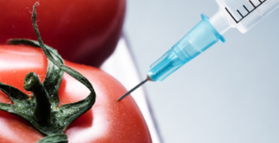 Genetically modified foods and you
Genetically modified foods and you
Posted on Sat, 24 Apr 10

The food biotechnology industry is blanketing propaganda about the safety of Genetically Modified Foods in the face of warnings about serious risks to human health from scientists and public health officials (1). There is a mass genetic experiment going on in our environment and diet and you are the guinea pig.
Franken foods
Genetically Modified (GM) food differs from classical plant breeding in that new genetic material is inserted into the genes of plants. While traditional plant breeding typically involved crossing the same or closely related species GM crops can be engineered using genes from any living organism including unrelated plants or animals. GM foods thus contain proteins that have never before been consumed as food and carry potential health risks (2).
Your hazard is high
Current estimates suggest that as much as 80% of processed foods in the U.S. contain GM foods such as such as corn starch, high fructose corn syrup, corn oil, canola oil, soybean oil, soy flour, soy lecithin, or cottonseed oil (2). Importantly, you may consume GM foods inadvertently due to contamination of food crops. For example GM corn intended for animal feed and not approved for human consumption was found in corn products and linked to suspected allergic reactions. Subsequently more than 300 brands of taco shells, crisps and other corn products had to be withdrawn from shops (3).
Dinner plate propaganda
The food biotechnology industry claim that there are advantages to GM crops, particularly increased food production and crop yields to combat world hunger, however the reality is more sinister. The argument that GM food crops are more productive has been criticised. Using ecological farming methods studies in china for example found that rice production dramatically increased and pesticided use was virtually eliminated without the need for expensive, patented gene-modified seeds (4).
It is more likely that commercial interests such as seed patents (seed and crops are owned by the GM seed producer) and the ability to engineer sterility into seed (harvested seed cannot be cultivated and has to be bought) is driving GM food production (4).
Risk to human health
Serious concerns have been raised about the safety of GM foods. Animal toxicity studies with certain GM foods have shown that they may pose health risks such as allergy, infertility, damage to organs and unexplained death. Unfortunately adequate safety data in humans is lacking despite the widespread cultivation and contamination of our global food supply with GM foods by a genetic engineering industry that claims to be “feeding the world (5).”
References
1. Rubin J, Tesmenitsky A. Selling before telling: why the government needs to take a second look at genetically engineered foods. New Solut. 2002;12(3):297-316
2. Lemaux PG. Genetically Engineered Plants and Foods: A Scientist's Analysis of the Issues (Part I). Annu Rev Plant Biol. 2008;59:771-812.
3. Friends of the Earth. Briefing, Genetically modified crops and food. January 2003.
4. Margulis C. The hazards of genetically engineered foods. Environ Health Perspect. 2006 Mar;114(3):A146-7
5. Dona A, Arvanitoyannis IS. Health risks of genetically modified foods. Crit Rev Food Sci Nutr. 2009 Feb;49(2):164-75.
Tags: Genetically Modified Foods




